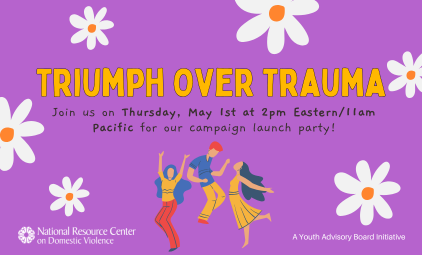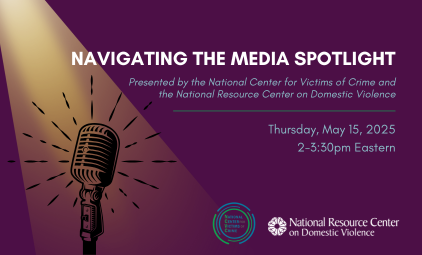By Shaina Goodman, Policy Manager, NRCDV
When I began volunteering and working in the domestic violence movement, it was as a front-line advocate, first in a transitional housing program and then in the courtroom. Soon, I transitioned to working on policy at the federal level – something I thought was related to, but ultimately separate from, the work I had been doing. But the truth is that those two forms of advocacy – direct, with survivors, and systemic, with policymakers – are closely connected. And both are necessary to improve the safety and well-being of survivors and their families.
Advocates working in local communities bring essential perspectives and knowledge to policy advocacy efforts. Advocates have unique and valuable insights into the diverse needs and lived experiences of survivors and their families. And they are well-positioned to gather and share information about survivors’ circumstances, the barriers they face, and the resilience they have – and what those things tell us about needed policy changes.
Now, perhaps more than ever, is a critical time for all of us to be engaged in advocating for the policies that will support survivors and advance the gender, racial, economic, and social justice that we are all deeply committed to as advocates.
What is – and is not – considered lobbying?
Lobbying is defined by the Internal Revenue Service (IRS) as “activities that attempt to influence legislation.” IRS rules state that “an organization will be regarded as attempting to influence legislation if it contacts, or urges the public to contact, members or employees of a legislative body for the purpose of proposing, supporting, or opposing legislation, or if the organization advocates the adoption or rejection of legislation.”
This means that many advocacy-related activities are not considered lobbying – generally speaking, this includes things like describing for a member of Congress or your state legislature how a federal or state grant that your organization receives helps support your work, or educating policymakers about the impact of a policy on survivors in your community. Through storytelling and data, you and your organization can make powerful and persuasive arguments about policies without ever engaging in activities that constitute lobbying.
What is considered lobbying, as the above IRS definition explains, is when you or your organization ask policymakers to support or oppose particular pieces of legislation (including appropriations, or funding, bills), or when you send out a “call to action” asking others to contact their legislators to support or oppose legislation.
Can my organization engage in lobbying activities?
The short answer is yes! Nonprofit organizations that wish to engage in lobbying by participating in efforts to influence specific legislation can do so legally – and, as Nayantara Mehta says, “getting involved in the legislative process and having a say in policy discussions is not just an appropriate role for nonprofits; it is vital. If nonprofits are not speaking on behalf of their often-vulnerable communities, chances are nobody else is either.”
NRCDV has developed a new special collection to help nonprofits understand how they can engage in legislative advocacy and lobbying in compliance with IRS standards. To give a general overview, the IRS rules permit nonprofits to engage in lobbying activities so long as it does not constitute a “substantial part” of what the organization does. This can be measured using either of two standards: 1) by meeting the “insubstantial part test” (this is the default standard used by the IRS but is more vague); or 2) by electing to use the 501(h) expenditure test, which sets out dollar limits based on the overall budget of the organization. Learn more about these two standards via the special collection.
In addition, some nonprofits mistakenly believe that if they accept federal grant funds, they cannot participate in lobbying activities. That is not the case. Nonprofits can participate in lobbying activities within the limits noted above – however, nonprofits receiving federal funds are prohibited from using federal funds to “influence federal, state, or local officials or legislation” and other prohibited activity specified by their federal funding source(s). Nonetheless, it can use other, non-federal funding sources to participate in lobbying activities.
Again, as advocates, you bring unique and valuable perspectives on the lived experiences of survivors and the particular impact that policies have on survivors, their families, and communities – and your voice is essential to the legislative process!
I want to participate in the legislative process! How do I do that?
Lobbying or engaging in legislative action can sometimes feel daunting for those who have not regularly participated in this process. I felt that way, too, when I first started doing this work. But lobbying and educating policymakers relies on many of the same skill sets and tools that are inherent in good advocacy – first and foremost, strong communication skills. Effective lobbying is also about good storytelling – coming prepared with both data and examples about how policies impact survivors’ lives and what changes are needed to improve their safety and well-being. Your experiences will enable you to tell compelling stories – just remember to uphold confidentiality – and if you aren’t sure where to turn for strong data points, check in with your state coalition or search VAWnet for stats and resources.
It’s also important to connect with others engaged in policy advocacy in your community – like your state domestic violence and/or sexual assault coalitions, and other coalitions or organizations working to advance gender, racial, and economic justice. Collaborating and joining forces in your advocacy efforts will help strengthen and amplify the voices of survivors and your message.
Our special collection includes more tips and strategies that will help you be an effective policy advocate.
For advocates and organizations that work directly with survivors every day, the policy process may sometimes seem far removed – but participating in that process is an essential part of our shared vision and mission.















